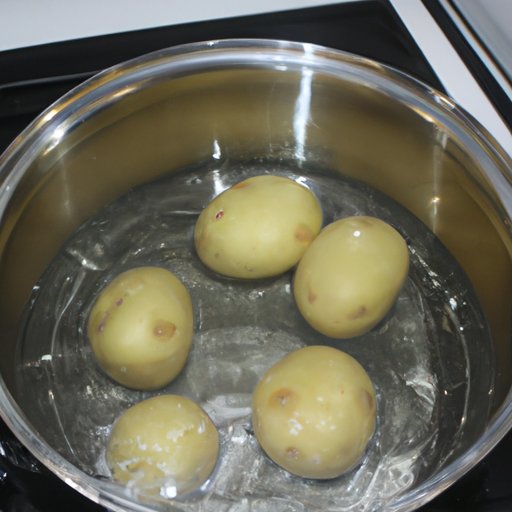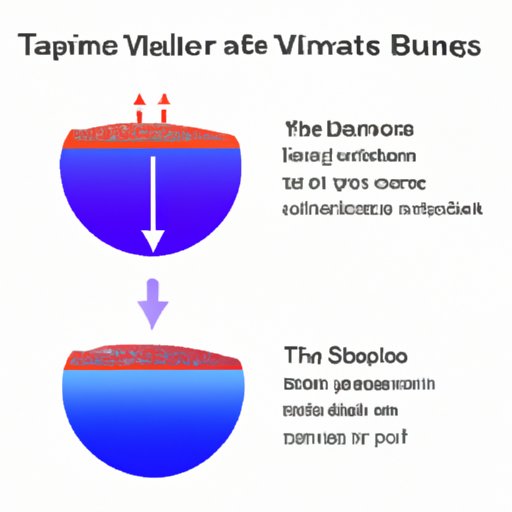
I. Introduction
Boiling potatoes is a staple of many dishes, from classic mashed potatoes to potato salads. However, getting it right can be difficult. Overboiling can cause your potatoes to become mushy, while undercooking them can make them hard and unappetizing. So, how long should you boil potatoes? In this article, we will explore the science behind boiling potatoes, your ultimate guide to perfectly boiled potatoes, and common pitfalls to avoid.
II. The Science Behind Boiling Potatoes
Before we discuss how long to boil potatoes, let’s delve into the science behind it. Potatoes are an excellent source of key nutrients, including potassium, vitamin C, and fiber. Boiling potatoes can cause some of these nutrients to leach into the water, reducing their overall nutritional value. However, boiling is still a healthy cooking method for potatoes, as it is a fat-free cooking method and potatoes retain most of their nutrients even when boiled.
The optimal boiling time for preserving potato nutrients varies depending on the potato type. For example, new potatoes, which are harvested early in their growth cycle, have a thinner skin and a waxy texture that helps them maintain their shape during cooking. They require a shorter boiling time of around 15 minutes. In contrast, larger and more mature potatoes, such as russets, need to be boiled for longer, usually around 25-30 minutes, to become fully cooked.
III. Your Guide to Perfectly Boiled Potatoes
Choosing the right type of potato is essential for achieving perfectly boiled potatoes. Waxy or new potatoes are best for dishes that require them to hold their shape, such as salads, while starchy potatoes are ideal for mashing. Before boiling potatoes, it’s essential to prepare them properly, scrubbing them thoroughly to remove any dirt or debris. This step also makes it easier to test if the potatoes are done.
Boiling techniques differ depending on the type of potato. New potatoes should be boiled in salted water for around 15 minutes, while larger potatoes can take up to 30 minutes. It’s essential to avoid over-boiling potatoes, as they will become mushy and difficult to work with. Finding the perfect boiling point can be a challenge, but keeping an eye on your potatoes and testing them often is a good rule of thumb.
IV. The Misconception About Boiling Potatoes
A common misconception about boiling potatoes is that they need to be boiled until they are entirely soft. Overboiling potatoes can result in a loss of flavor and nutrients, resulting in mushy and unappetizing potatoes. In contrast, undercooking potatoes can result in uncooked or hard centers, which is equally undesirable. As mentioned earlier, getting the boiling time right depends on the potato type, and it’s important to test the potatoes regularly while boiling.

V. How Altitude Affects Boiling Time
Altitude plays a significant role in boiling time. At higher altitudes, where atmospheric pressure is lower, water boils at a lower temperature—therefore, potatoes boil at a lower temperature and require more time. If you live at high altitudes, you should adjust boiling time by adding 1-2 minutes to the recommended boiling time. Keeping an eye on the potatoes is essential, as slight variations in altitude can result in differences in boiling time.
VI. The Role of Potato Size in Boiling
Size is another critical factor that affects boiling time. Small potatoes cook faster than large potatoes due to their size. Preparing small potatoes for boiling involves washing them and then cutting them into bite-sized pieces to ensure even cooking. Large potatoes require more time to cook, and it’s important to choose the right boiling time based on their size for perfect results.
VII. Simple Tricks for Testing Potato Doneness
Testing potato doneness is an essential step in achieving perfectly boiled potatoes. One of the easiest ways to test if a potato is cooked is to pierce it with a fork. If the fork can be inserted easily, the potato is cooked through. Potatoes with uncooked centers will resist the fork and require more boiling time. The skin should also be easily removable from the potato if it’s fully cooked.
VIII. Time-Saving Methods for Boiling Potatoes
Boiling potatoes is a time-consuming process. However, there are some time-saving methods that can speed up the process. One way is to pre-boil potatoes for a few minutes before putting them into the boiling water to ensure even cooking. Another method is to use a microwave or an instant pot. These appliances can speed up boiling time but require careful monitoring to avoid over-boiling and under-cooking.
IX. Conclusion
Boiling potatoes is a simple process, but it’s easy to get it wrong. By following the tips in this article, you can achieve perfectly boiled potatoes every time. Remember to choose the right potato type, prepare them correctly, and test them often. With time and practice, you’ll find the perfect boiling time that works for you.
So, how long should you boil potatoes? That depends on the type of potato, the size, and altitude. However, with careful attention and practice, you’ll find the perfect boiling time that leads to delicious and nutritious potatoes.





